Major Dundee Blu-ray Movie
HomeMajor Dundee Blu-ray Movie 
Limited Edition to 3000 - SOLD OUTTwilight Time | 1965 | 1 Movie, 2 Cuts | 136 min | Rated PG-13 | Apr 15, 2013
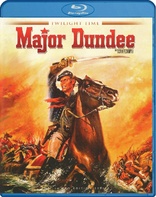
Movie rating
6.9 | / 10 |
Blu-ray rating
| Users | 0.0 | |
| Reviewer | 4.0 | |
| Overall | 4.0 |
Overview
Major Dundee (1965)
An obsessive Union officer leads a squad of Rebel prisoners, ex-slaves and criminals into Mexico to hunt down a band of murdering Apaches.
Starring: Charlton Heston, Richard Harris (I), Jim Hutton (I), James Coburn, Michael Anderson Jr.Director: Sam Peckinpah
| Western | Uncertain |
| War | Uncertain |
| Adventure | Uncertain |
Specifications
Video
Video codec: MPEG-4 AVC
Video resolution: 1080p
Aspect ratio: 2.35:1
Original aspect ratio: 2.35:1
Audio
English: DTS-HD Master Audio 5.1 (48kHz, 24-bit)
English: DTS-HD Master Audio Mono (48kHz, 24-bit)
Music: DTS-HD Master Audio 2.0 (48kHz, 24-bit)
Subtitles
English SDH
Discs
50GB Blu-ray Disc
Two-disc set (2 BDs)
Playback
Region free
Review
Rating summary
| Movie | 3.5 | |
| Video | 4.0 | |
| Audio | 4.5 | |
| Extras | 3.5 | |
| Overall | 4.0 |
Major Dundee Blu-ray Movie Review
The Dirty Several Dozen.
Reviewed by Jeffrey Kauffman April 20, 2013The western was in a transitional state in the sixties. The so-called “adult western” as exemplified by the collaboration between Anthony Mann and James Stewart seemed to be in decline, and, as the decade started anyway, huge epics (or would be epics) and more intimate character pieces galloped in to take their place. Interestingly right off the bat in the sixties two vaunted directorial debuts by famous actors resulted in notorious bombs when 1960 gave us John Wayne’s The Alamo and 1961 gave us Marlon Brando’s One-Eyed Jacks. Occasional rousing hits came along, films like The Magnificent Seven and the Cinerama blockbuster How the West Was Won, but truly innovative films that managed to be both popular and critical successes became quite a bit more rare as the decade wore on. While iconic directors like John Huston (The Unforgiven) and genre stalwart John Ford (Two Rode Together, The Man Who Shot Liberty Valance, Cheyenne Autumn) sought to invest the western with a new energy, it increasingly fell to younger, lesser known directors like Martin Ritt (Hud, Hombre) and of course Sergio Leone (The Man with No Name Trilogy) to take up the mantle and move the idiom in new directions. Nestled in the background of all these developments was Sam Peckinpah, who quietly entered the scene with the little remembered 1961 western The Deadly Companions and then made his first real impact a year later with Ride the High Country. Peckinpah seemed poised to be something akin to the “new John Ford”, albeit one with a completely different sensibility (and one might assume political bent). After the critical acclaim of Ride the High Country, Peckinpah moved on to Major Dundee reportedly at the request of none other than Charlton Heston himself, after Heston had viewed an early screening of Ride the High Country. Peckinpah may have fallen victim to that old bugaboo of believing one’s press, for he undertook what was a massive project without the requisite experience, resulting in an overblown budget, an angry and increasingly intrusive studio, and, ultimately, a butchered film that was a gigantic flop and critical failure. And yet the “legend” of Major Dundee endures, fostered by ardent Peckinpah fans who consider it a misunderstood masterpiece, as well as perhaps less favorably inclined folks who see the film as a perfect example of directorial hubris, a direct precursor in more than one way to Heaven's Gate.
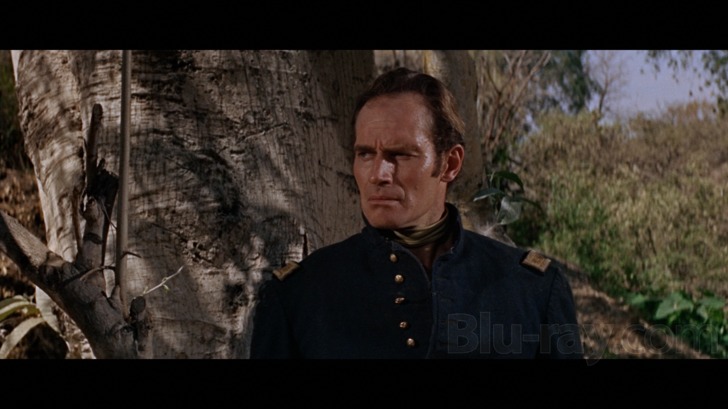
By most accounts, Major Dundee was supposed to be one of those “intimate epics” that directors like David Lean had started to offer in such films as Lawrence of Arabia. A more suitable antecedent, in its literary form if not its cinematic adaptation, might be Herman Melville’s Moby Dick, as is discussed in the excellent commentary ported over from the previous Special Edition DVD of Major Dundee. Peckinpah evidently wasn’t shy about comparing Dundee to Dick, drawing parallels between both works’ obsessed leaders who sow the seeds of their own destruction courtesy of their ineluctable compulsions. But what’s so incredible about the scope of Major Dundee is how spectacularly ill prepared Peckinpah evidently was to handle the simple logistics of the shoot, including never really having a finished script and then wasting huge amounts of his budget scouting locations (with something akin to Ken Kesey’s circus like Merry Pranksters in tow), when the finished film bears little if any imprint of that quest.
The basic plot of Major Dundee actually is perhaps at least a little comparable to The Dirty Dozen (Dozen's director Robert Aldrich would take his own stab at a "new" western with Ulzana's Raid a few years later). Major Dundee (Charlton Heston) is a disgraced Union cavalry officer during the Civil War era who has been sent to manage a Confederate prisoner of war camp, where he gets up close and personal to a recent Apache atrocity where a number of civilians as well as Union soldiers were mercilessly slaughtered. Dundee decides to exact revenge on the Apache chief Sierra Charriba (Michael Pate), enlisting his own brigade of prisoners, chief among them his old West Point buddy Captain Tyreen (Richard Harris), a Confederate officer who bears a long festering grudge against Dundee. Also joining Dundee’s ranks are a coterie of Union soldiers (both black and white), tagalong mercenaries and a few Native American scouts. The bulk of the film depicts the chase to bring the Apache to justice as well as simmering tensions within Dundee’s motley crew of fighters.
The commentary track mentions a couple of interesting (if debatable) parallels between Major Dundee’s allusions to then current sociopolitical events and Peckinpah's usually evident political leanings, namely the nascent buildup of the Vietnam War and Dundee's depiction of the unexpected effects of unbridled international marauding adventurism. Perceived connections like this might be inevitable given the oft-discussed parallels between Peckinpah’s later films (notably The Wild Bunch) and the end (or at least beginning of the end) of the Vietnam quagmire, but analysts may in fact be over interpreting Peckinpah’s intent. The film seems much more about Dundee’s increasingly irrational obsession than it does about making any overt (or indeed circumspect) political statement. Perhaps the more facile comparison to films like The Wild Bunch comes courtesy of Peckinpah’s unflinching depiction of the violence of the American West. As the commentary track mentions, this film often plays like the flip side of a John Ford western, where the gruesome realities of life (and especially death) in the Old West aren’t simply hinted at, they’re shown in all their bloody splendor. (The film makes several outright references to Ford's oeuvre.)
The film is stuffed to the gills with a huge supporting cast, including nice work by James Coburn as a one armed scout, Brock Peters as the leader of the contingent of black soldiers, Ben Johnson as an aide to Tyreen, Jim Hutton and Michael Anderson, Jr. as young Union soldiers in Dundee’s brigade, and Slim Pickens and Dub Taylor contributing some highly questionable comedy relief. Senta Berger shows up fairly late in the film to provide some brief romantic interest, but as with quite a bit else in Major Dundee, she seems shoehorned in as if a committee of writers suddenly decided a voluptuous female was all the the film needed to really take off.
And so what are we left with, in either the original theatrical cut or the “restored” version, which is actually the original, longer edit that producer Jerry Bresler left in Columbia’s hands before jaunting off to Europe, only to receive a missive from the studio that further cutting was going to be done and that "resistance was futile". Even the Peckinpah authorities on the commentary track can’t come to much agreement in terms of specifics. Some like certain scenes, others hate them; some prefer aspects of the longer cut, others insist that some of the excised material actually should have been excised. This serves only to highlight what an unkempt mess Major Dundee is, a huge, unruly spectacle that is undeniably visceral and often quite effective, but which can never quite escape its own lack of discipline. In a bit of probably unintentional irony, Peckinpah was in fact his own quasi-Dundee on this picture, a man compelled by unseen forces who found his “mission” unattainable, and who (by some accounts at least) became increasingly unhinged, drowning his sorrows in copious amounts of alcohol in an effort to cope with a deteriorating situation. Unlike Dundee, however, Peckinpah lived to fight another day.
Major Dundee Blu-ray Movie, Video Quality 
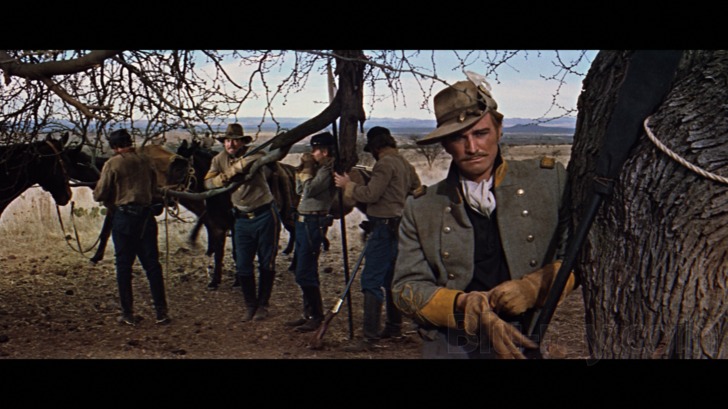
Note: Screenshots 1-13 are from the Extended Version. Screenshots 14-23 are from the Theatrical Version.
Major Dundee is presented on Blu-ray courtesy of Twilight Time with an AVC encoded 1080p transfer in 2.35:1 for
both its original theatrical cut as well as the 2005 extended cut restoration. I have to wonder if the masters utilized for this
release are from 2005 as well, and curmudgeons may wonder what could have been done with newer
technology. The bulk of both of these presentations looks very good indeed, with the same much improved color timing
that graced the Special Edition DVD (though flesh tones are a bit on the brown side for my personal taste) as well as better
clarity and contrast. There are some anomalies here, however,
including some persistent ringing which is quite evident at times (see the screenshot of James Coburn for one especially
bad example). Though the restored elements were evidently taken from color separation masters, some of them seem a bit
ragged looking when compared to the rest of the film. Still, when compared to the awful looking first releases of this film
which
were foisted upon the home video market and especially when compared to the atrocious pan and scan broadcast prints
that used to show up on television back in the day,
seeing Major Dundee now in all of its widescreens splendor is a bit of a revelation. Is it perfect? No, but it's
probably the best we're going to get.
Major Dundee Blu-ray Movie, Audio Quality 
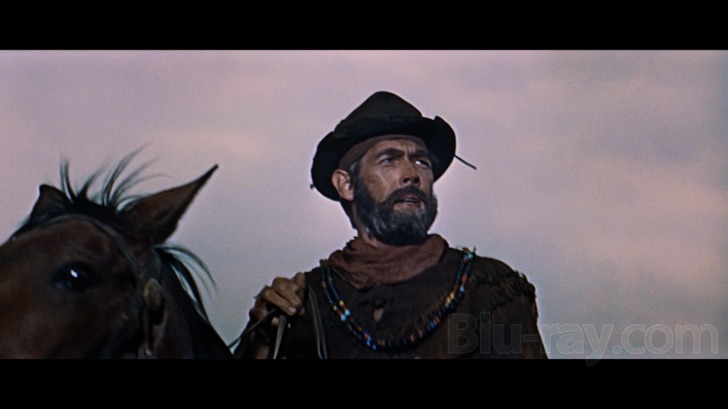
Major Dundee's extended version features a lossless DTS-HD Master Audio 5.1 accounting of the repurposed 5.1 track that debuted in 2005. This is a rather carefully reconstructed track that doesn't err on "tarting up" the sonic atmosphere so aggressively that it sounds unnatural. Caliendo's score is splayed rather widely across the surrounds, while discrete channelization of foley effects is very smartly handled. Dialogue is cleanly presented and fidelity is excellent. Dynamic range is quite wide. The original theatrical version sports a lossless DTS-HD Master Audio Mono track which more than capably recreates the original theatrical experience. Once again fidelity is excellent, though dynamic range is just a tad more muted due to the narrowness of the track.
Major Dundee Blu-ray Movie, Special Features and Extras 
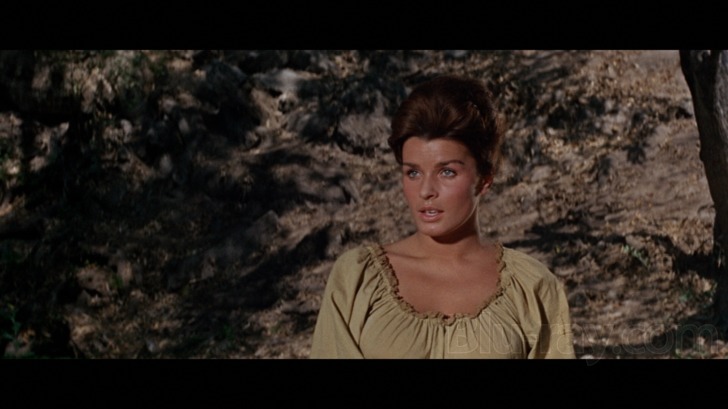
Disc One
- Extended Version (1080p; 2:15:47)
- Audio Commentary with Nick Redman, Paul Seydor, Garner Simmons and David Weddle. This is a fantastically interesting commentary featuring several Peckinpah scholars and moderated by Redman. It's fascinating to hear these guys debate various scenes in the film, and the disparity of opinion is quite instructive that when regarding a film with as convoluted a history as Major Dundee, it's best not to jump to too many concrete conclusions. One of the interesting albeit tangential things about this commentary, which was done before the final extended version was ready for release, is that you can hear the Amfitheatrof score rather than the Caliendo score playing in the background.
- Isolated Score by Christopher Caliendo is presented in DTS-HD Master Audio 2.0. Caliendo was hired to rescore the extended version, since so many people have such a problem with the original score (see below) and features a less obtrusive set of cues. If it's not overly memorable, it at least sounds excellent in this lossless environment.
- 2005 Re-Release Trailer (1080p; 2:25)
- Original Theatrical Cut (1080p; 2:02:16)
- Isolated Score by Daniele Amfitheatrof is presented via a DTS-HD Master Audio 2.0 mix. Amfitheatrof's score has been unfairly maligned (in my opinion), often blamed for "ruining" Peckinpah's film. While it's true that several cues are anachronistic, almost like something out of a science fiction film (including the totally bizarre "Apache" effect, which sounds like it's introducing a Star Trek alien), and while it's obvious that the inclusion of Mitch Miller's Sing Along Gang on the opening theme was a blatant attempt to recreate the commercial success of "The Colonel Bogey March" from The Bridge on the River Kwai, there's actually a lot to like in this score, especially when visited as a "standalone" element.
- Silent Extended Outtakes (480i; 4:19)
- Trailer Artwork Outtakes (480i; 2:07)
- Exhibitor Promo Reel Excerpt (480i; 1:20)
- Extended Scene: "Major Dundee and Teresa" (480i; 00:39)
- Incomplete Deleted Scene: "Knife Fight" (480i; 3:37)
- Original Theatrical Trailer (1080p; 3:25)
Major Dundee Blu-ray Movie, Overall Score and Recommendation 
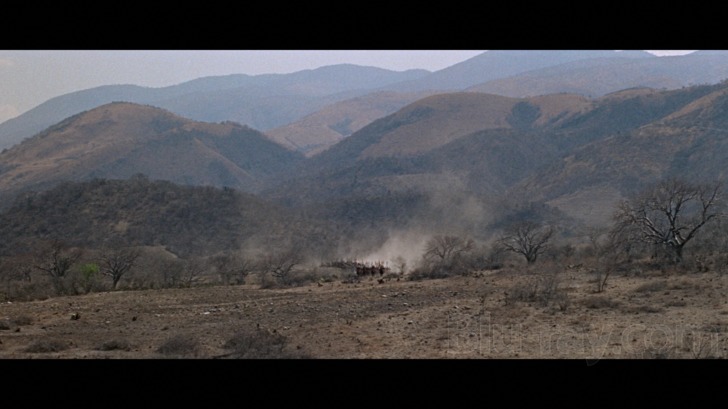
I've seen Major Dundee in both its theatrical version and the extended version scores of times over the past several decades and I have to say I enjoy it more every time I see it, certainly one reason to believe that not even its storied "issues" have completely subsumed an inherent quality in the piece. Major Dundee is like an errant child who willfully misbehaves—you can't completely condone it, and yet its very unruly qualities are part of its undeniable allure. Peckinpah loved to battle with The Man, usually personified by whatever studio executive he was currently "encumbered" by, and one has to wonder whether Peckinpah had the same self-destructive tendencies that color the character of Dundee himself. I personally don't think Major Dundee is a masterpiece, something that probably puts me at odds with many Peckinpah fanatics, but I do think the film is far better than it's generally given credit for being. This new Blu- ray sports generally very good video, superb audio, and good supplements (though it's disappointing that not all of the DVD extras have been ported over). Sometimes noble failures are more instructive to film fans than blockbuster successes. I'd put Major Dundee at the head of the list in that particular category. Highly recommended.
Similar titles
Similar titles you might also like

Macho Callahan
1970

Fort Yuma Gold
For a Few Extra Dollars / Die Now, Pay Later / Per pochi dollari ancora
1966

Duel at Diablo
1966

A Reason to Live, A Reason to Die
1972

The Horse Soldiers
1959

They Came to Cordura
1959

Hostiles 4K
2017

Rio Grande
1950

The Professionals
1966

Rio Lobo
1970

Ulzana's Raid
1972

Fort Massacre
1958

Jane Got a Gun
2015

The Appaloosa
1966

The Jayhawkers
1959

Bite the Bullet
Limited Edition to 3000 - SOLD OUT
1975

The Magnificent Seven Ride!
1972

The Train Robbers
1973

The Revengers
1972

In a Valley of Violence
2016

